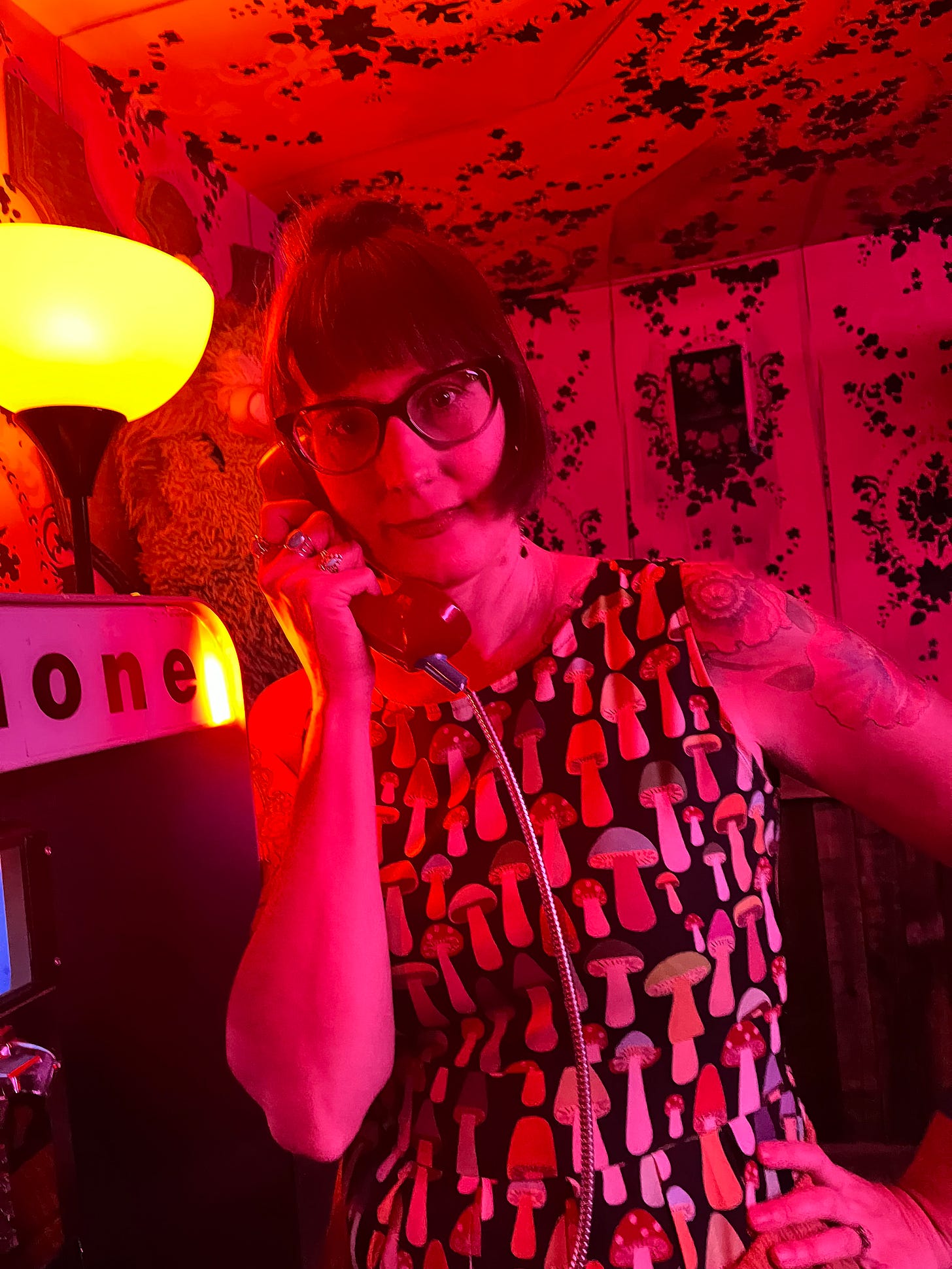Did that sound cheeky or inappropriate? I hope not, because I’m being serious. For at least a year now, I have been actively considering getting an evaluation for ADHD. And for decades, I have quietly wondered if I had undiagnosed ADHD as a child (back before there was an “H” and it was just attention deficit disorder). I was always a straight-A student and I literally never broke any rules, so why would I have been on anybody’s radar? The classic “ADD kid” from the 80s and 90s was the little boy who couldn’t sit still and disrupted class, not the uber-quiet girl whose teachers gushed endlessly about her at parent-teacher conferences.
But for most of my educational career, I found myself frequently lost in my own thoughts. I would have this visceral panic moment when I realized—cheeks burning and heart pounding—that I had absolutely no idea what was going on. I had no clue what my teacher was talking about; I had essentially missed the lesson and I honestly couldn’t even remember why. I had followed my thoughts down a rabbit hole and now there was no digging out. Maybe I was writing a story or poem in my head, maybe I was absorbed in a confrontational fantasy about what I *should* have said to that kid on the playground yesterday, maybe there was a song lyric playing itself over and over and over in my brain while I unconsciously tapped out the syllables on my fingers. Whatever I was doing, I was not paying attention. And now I was fucked, and flooded with anxiety and shame. Rinse, repeat. If I was ever caught not paying attention, my humiliation multiplied.
Because I was also a tightly wound, anxious overachiever, it was very easy for me to mask whatever neurodivergence was lurking behind the scenes. Nobody would ever know my secret. And regardless of what “condition” I did or did not have, however a clinician would have categorized me, I developed a deep, persistent belief that I was inadequate. I had missed the memo, didn’t understand the rules of the game, failed to hear the instructions, and now I needed to rely on somebody else to compensate for me, hold my hand, or cover for me. I was not enough on my own.
It’s only as I’ve done a deep dive into Internal Family Systems (IFS) therapy for the past year-and-a-half that I’ve started to unravel some of these deeply rooted patterns, habits, and beliefs. And I’m left with a lot of questions.
Namely, do I actually have ADHD, and does it even matter?
About a year ago when I discussed it with my doctor, she gave me the “basic” questionnaire and concluded that yeah, it seemed likely that I met the criteria to be diagnosed with ADHD. She went on to say that if I wanted to take medication, I would need an actual evaluation and diagnosis, but if I didn’t, it was kind of pointless to go through the process. I quickly dismissed that idea, telling her I didn’t think I needed meds; I was mostly curious and maybe also wanted some strategies for coping and management. (Fast forward to this present moment in my life and I’m no longer certain that meds might not be useful. . .)
As I brought up my suspicion that I had undiagnosed ADHD with various friends and family members, their responses were varied. A few barely masked their disdain, and for a while, one of my beloved family members who shall remain nameless would snort and rudely refer to my “ADHD” in air quotes whenever I was flighty or forgetful. Others told me that they thought they had it, too, and a few close friends and I tried to actively support and validate one another. Some told me meds changed their lives.
But there was one common response that continues to bother me. “Oh, that’s totally normal. I feel like that all the time.” It was sort of a hybrid of being dismissive and validating all at once. Becauses if you ask a woman my age—especially a mother— whether she experiences any of the following, most would categorically say YES.
Do you feel underwater?
Are you always asking yourself, “Why did I walk into this room?”
Do you get distracted mid-task and start doing something else, then forget what you were originally doing?
Do you forget to return emails, text messages, or phone calls?
Are you overwhelmed by your to-do list, messy house, and mental load?
While these could very well be indications a person may have ADHD, they are also solid proof of another epidemic: Life is stressful AF right now. I could very easily zoom in and focus on moms, perhaps about my age, as we stereotypically perform the most invisible labor, a term that has worked its way into the lexicon of the masses, thanks in part to this amazing article by Gemma Hartley in 2017.
But of course, there are plenty of other demographics besides mothers who carry an unbearable mental/emotional load—women in general, dads (uncoupled ones probably more so), grandparents, teachers, caregivers, health care workers, the list goes on. If everyone is so burned out and overwhelmed that we don’t know where to look, what to focus on, which task to do first, where to begin, and seriously WHY THE FUCK DID I WALK INTO THIS ROOM, how are we supposed to separate out what’s what? What is anxiety? What is ADHD? What is autism spectrum disorder? What is depression? What is perimenopause (No thanks, I’ll pass, please)? What is garden variety, “Holy shit it is difficult to be an adult human in the age of digital overload?”
I don’t know the answers. And I’ve also never been able to truly grasp how my own internal experience differs from everyone else’s. While I fully realize most other women my age are burned out and overwhelmed, I also suspect that I may be just a *touch* weirder than most people. I do not mean that in a self-deprecating way; I’m just stating facts here, folks. I think my brain is noisier, busier, and more distractible than most. I also know that while I struggle to remember which task I was just working on, I could lose myself for HOURS working on a project I enjoy (see: writing).
A dear friend of mine sent me “How to Keep House While Drowning,” and it has given me a lifeline to help me stay on top of household “care tasks” (my new favorite term, along with my discovery that, according to Davis, these tasks are morally neutral). Sidenote: I keep meaning to listen to the author’s podcast, Struggle Care, but I. Keep. Forgetting.
So today, I am here with curiosity and lots of questions. And I want to hear from you, because diagnosis or not, my maybe-ADHD has shaped my self-esteem, how I operate in relationships, and has had a profound impact on the narratives I have about myself— untangling this is an important part of writing my memoir.
I’m asking for your comments (either here, on FB, via private message or email, whatever you’re comfortable with) about your thoughts on ADHD vs overwhelm. Have you struggled with this? Do you think you might have adult ADHD? Do you think, in general, we are all just fucked? Please share your experiences, wisdom, or commiseration, and pass on to others swimming in this underwater world of fragmented overwhelm. 😉
XOXO,
Steph
As always, I am honored and grateful for your subscriptions—paid or not—as I am regularly writing on my Substack while I work on my memoir and also as a means of supporting my family with my writing. THANK YOU for being here!








That’s a massive suitcase for me to unpack... which says a lot when you have ADHD - that suitcase can sit there for months as long as you don’t see it. Once again, you’ve managed to hit the nail on the head with your writing. If you would like a rambling speech to text letter on ALL of the things, I’ve got you.
OHmygosh Stephanie, I could have written this word for word myself. Even down to "I've been wondering about this for about a year." I feel like, if you've been wondering about it and suspecting it, then probably yeah, there's a good chance you have it. I was evaluated in August, Dx'd in September, and started meds in November, and it's been absolutely life changing. From small details like remembering where I parked my car in a parking lot - easily and without really thinking (racking my brain) about it - to massive things like sleeping better than I ever have in my life because finally my brain is calm.